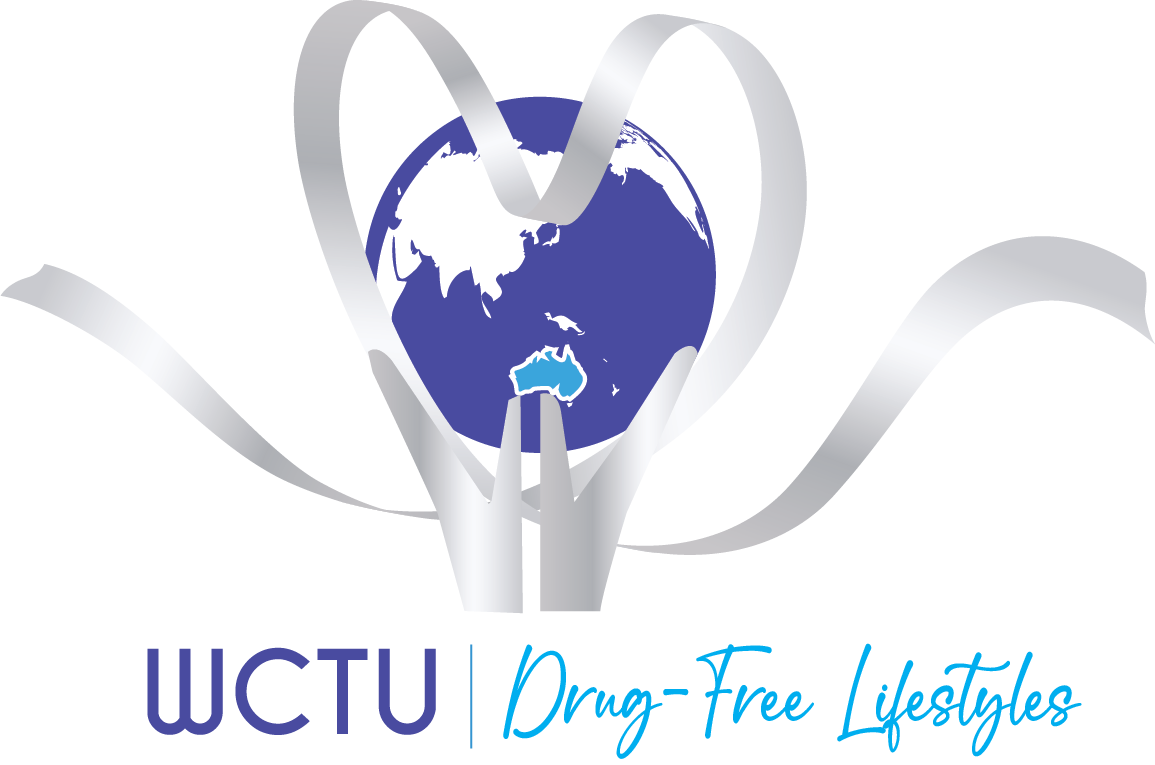About us
Meet Our Team



Our History
Our Journey has spanned generations and continents
Origins
The Woman’s Christian Temperance Union (WCTU) was founded in November 1874 in Cleveland, Ohio, USA, to combat the harmful influence of alcohol on families and society. Round-the-world WCTU missionaries helped to establish WCTUs in many countries and, in 1883, under the leadership of Frances Willard, the World’s Woman’s Christian Temperance Union was formed.
Women who joined the WCTU signed the following pledge:
“I hereby solemnly promise, God helping me, to abstain from all alcoholic liquors as beverages, whether distilled, fermented or malted, from opium in all its forms and to employ all proper means to discourage the use of and traffic in the same.”
A modern version of this pledge is still a requirement for WCTU membership worldwide.
The purpose of the Woman’s Christian Temperance Union of Victoria from its origin in 1887 was set out in its motto – “For God, Home and Humanity”.
In recent years WCTU in Victoria adopted a trading name, WCTU Drug-Free Lifestyles.
The Mission Statement was updated in Victoria in the 1990s to:
“To promote a Drug-Free Lifestyle and Christian Values in the Home and Community.”
These values have been pursued consistently, in varying forms, throughout its history.
WCTU in Victoria Begins
Mrs. Marie Kirk who had come to Melbourne from London in 1886 was the main organizer and the first Secretary and was the heart of the organization for 26 years. The first President, Mrs. Mary Love, had been a member of WCTU in USA before she too came to Melbourne in 1886.
WCTU was a founding member of the National Council of Women Victoria in 1902. WCTU has been a continuing member of NCWV.
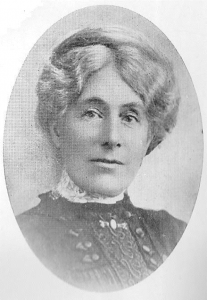
Mrs Marie Kirk
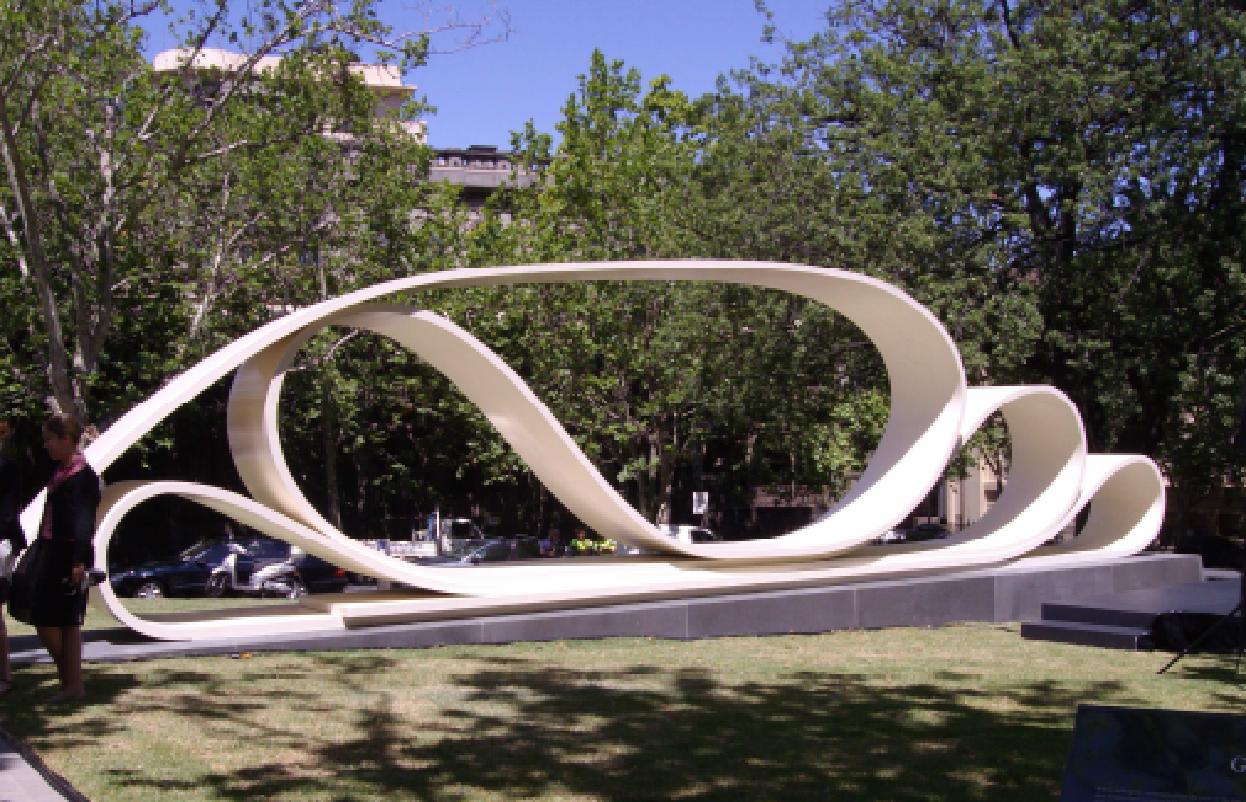
Sculpture of the Great Petition in Gardens near Parliament House
One of the aims of the WCTU was the establishment of the understanding of the equality of the status of women and men. Consequently, in 1894 a public meeting was called at WCTU headquarters and the Women’s Franchise League was formed. WCTU members worked tirelessly on the great petition asking for the right for women to vote. In 1902, Victorian women were allowed to vote in Federal elections, but it was not until 1908 that they could vote in State elections. Although the Legislative Assembly had voted in favour often, the Legislative Council had rejected it 17 times.
Welfare of Children
From its inception, WCTU was concerned about the welfare of children. Its early work included establishing the first Kindergarten in Victoria, in Richmond in 1909. This was continued for more than 40 years. It also set up the State’s first School for Mothers, the forerunner of Baby Health Centres.
From the beginning, WCTU was concerned with country girls in Melbourne, and its early headquarters included dining rooms and cheap accommodation for them. In 1931 a Young People’s Branch was formed and youth camps held. In the 1980’s a Miss Temperance Quest was held for several years to encourage young women.
Prison Work
Prison Work was an outreach from the beginning. At the first State Convention in 1888, the Department of Prison Work was formed, and members in the city gave much practical help to women prisoners by visiting, teaching them simple sewing and craft work, helping their families, and assisting them when they were released. Women visiting prisoners in Pentridge were dismayed at the derelict conditions and worked for the establishment of a new women’s prison at Fairfield in 1954. A window in the WCTU headquarters in Russell Street at this time displayed their craftwork for sale, until they began to work directly for firms. Today, WCTU still takes an interest in assisting women prisoners and donates to Prison Fellowship which specialises in this work.

Serving non-Alcoholic Drinks
In the 1950s, a campaign to promote non-al drinks as an alternative for alcoholic drinks began. This was the
SF Movement:
- Social Freedom from pressure to serve alcohol as a drink.
- Serving Fruit-drinks as an attractive alternative to alcohol.
- Safety First by promoting alcohol-free driving and urging the adoption of blood or chemical tests for drivers to detect blood alcohol levels. Blood alcohol tests are long since an essential part of road safety and WCTU continues to promote non-al drinks and cooking without wine. New recipes are produced regularly.
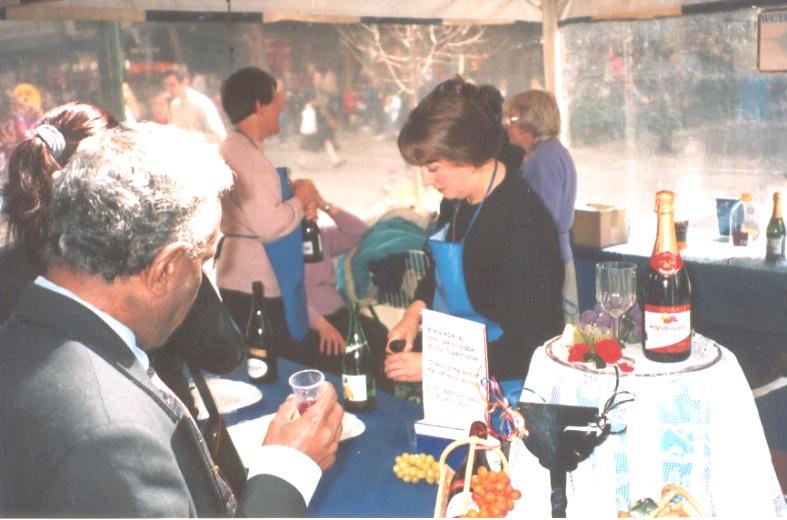
Lobbying
Throughout its long history, WCTU has worked and written letters to Members of Parliament and other relevant authorities about issues with which it is concerned, particularly regarding alcohol policy, moral issues and the welfare of women and children, especially regarding family violence. This continues. Through the years, submissions have been made to ANZFA and others regarding the need for warning labels on alcoholic drinks concerning the dangers of drinking alcohol while pregnant. It is good to know that such labels have now been mandated.
WCTU wrote to the Government regarding the need to increase taxes on ‘alcopop’ drinks - pretty drinks resembling soft drinks but with often more than 5% alcohol - which were aimed at young people. The government did this and consumption of these drinks decreased. On similar lines, we objected successfully in 2002 to the introduction of a product called “Moo Joose” - milk with alcohol added. In 1998 and 2021 WCTU wrote letters opposing a proposal to allow the sale of liquor from milk bars, service stations and convenience stores and this did not proceed. No doubt many others also opposed these matters, but we added our voice. This happened again in 2020 when WCTU joined with others in successfully opposing Dan Murphy’s plan for a huge bottle shop near a dry aboriginal area in Darwin.
Education
One of WCTU’s main focusses has been to reach children and young people with the message about the danger of alcohol and other drugs. In the late 1990’s this included Youth Breakfasts which were held at the Victoria Hotel. A teacher and several students from schools near the city were invited, and there were well-known speakers such as the footballer, David Parkin, and Dr. Michael Carr-Greg.
In 2008 Ellen Chandler organised our most successful youth outreach with 300 volunteers over five nights at the National Christian Youth Convention. More than 1600 drinks were served as young people were introduced to non-al drinks and a drug-free lifestyle.
Various competitions have been held to reach young people including colouring, poster, web design and “Mocktail” contests.
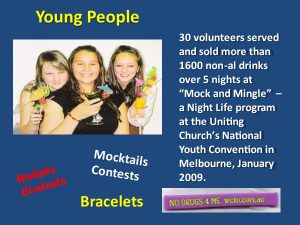
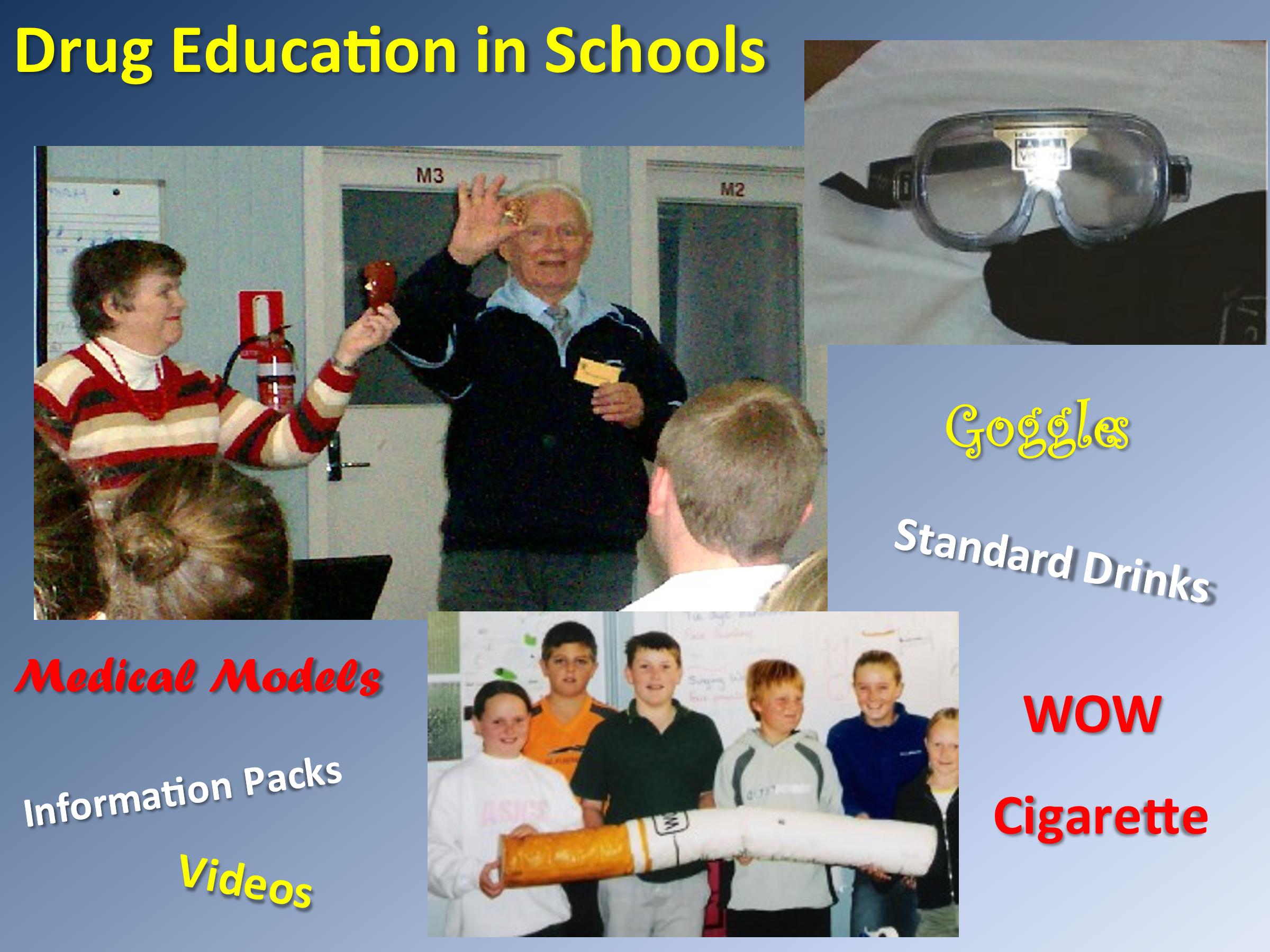
Drug Education in Schools had been developed in the 1970s and 80s by Margaret Rayment and Ruth Miller and they, often assisted by Nancy Garth, did excellent work in schools. One leaflet they wrote, based on medical models they used, “Seeing is Believing”, is still used. They gradually handed over to Anne Bergen by 1995 and Anne, with Robyn Welham or Jan Shattock continued this valuable work. For a short time in 2004, Mark Corrigan became part of the team and played an important part by updating their equipment and presentation in line with changes in technology.
Eventually, by 2010, there were two teams – Anne and Roger Bergen, and Jan Shattock and Rhona Theodore. In 2015 WCTU employed Dawn Stark as the Drug Ed Presenter. Dawn continues with this valuable work which, of course, was impacted by COVID -19 restrictions in 2020 and 2021.
About 1000 students annually in State and Christian Schools in country and city areas were involved in the presentations which were greatly appreciated by teachers and students, mainly in Grades 5/6 and Years 7/8.
Information Leaflets
WCTU has produced a range of excellent information leaflets, many of which are used in the Drug Ed programs, and are widely distributed where appropriate.
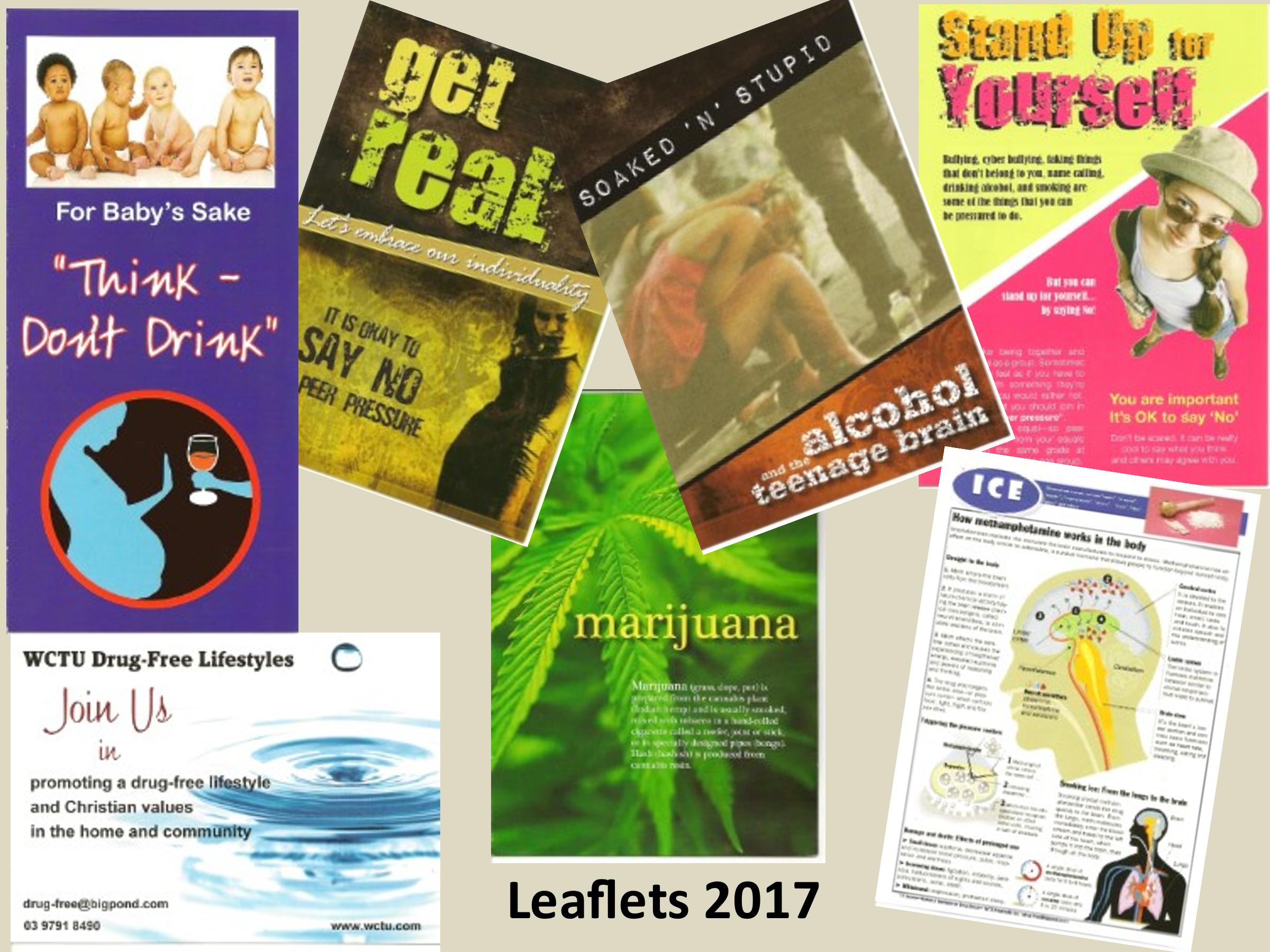
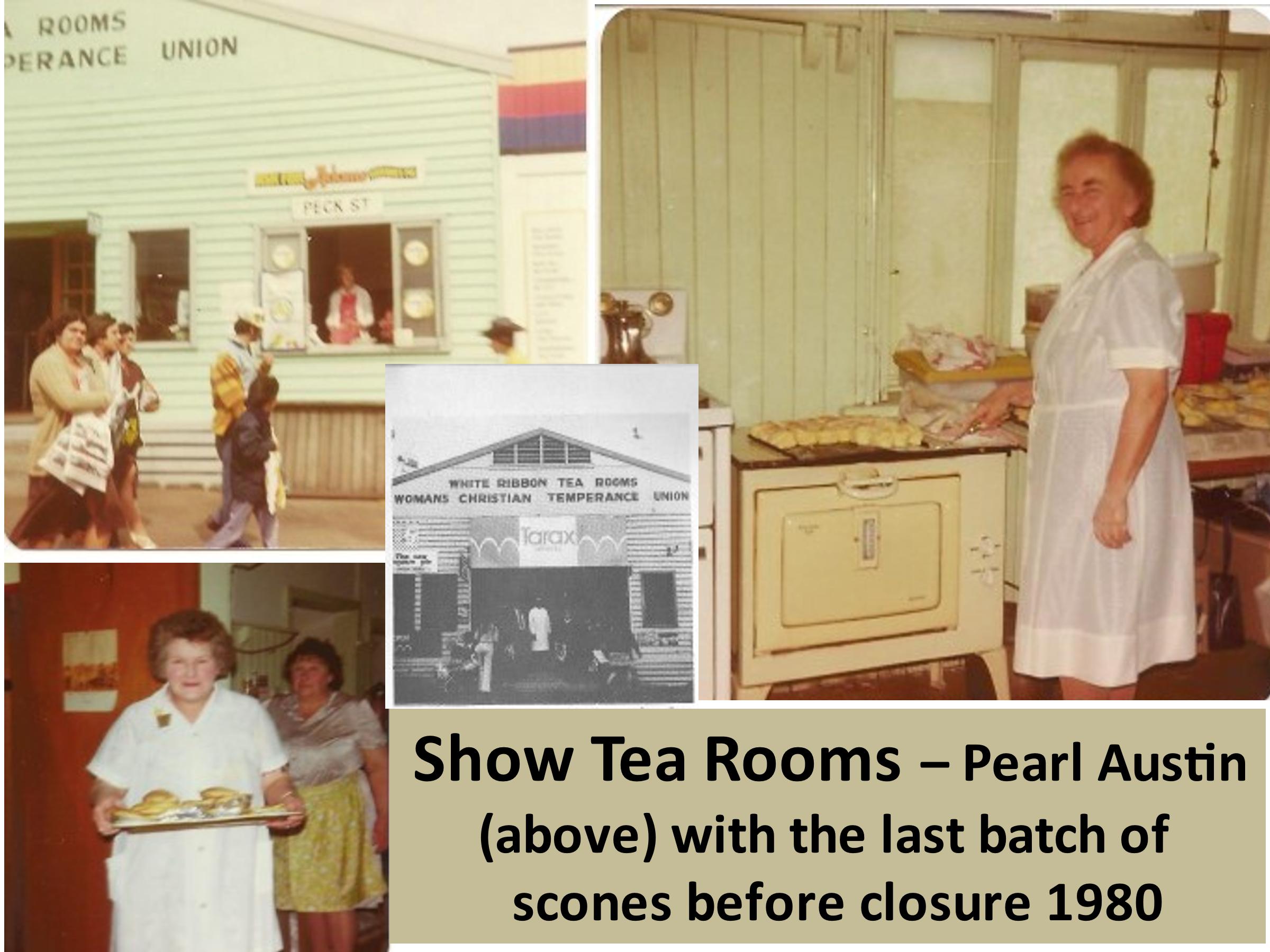
Tea rooms
As early as 1898 WCTU was able to have a booth at the Royal Melbourne Show to provide a place where women could rest, attend to their children, and have refreshments. At first, the “Tea Rooms” was only a marquee but later, a building was acquired, and the tasks of making sandwiches, cooking scones, cakes and pies and serving tea and non-al drinks were carried on by a willing band of members until 1980, when the building was demolished to make way for the remodelling of that area. Following the closure of the tea rooms a self-contained van was bought and served as a Mobile Display Unit at country shows, camps, town fairs, and youth events.
Functions at the Melbourne Town Hall
In 2003, it held a forum on Binge Drinking and Teenagers. In 2004 WCTU joined with other organisations to put on an exhibition celebrating the Centenary of Women in Victoria gaining the vote and, in 2012, the celebration of 125 years of WCTU was a grand occasion entitled “Button-up Boots to Stilettos”, with over 100 people joining in morning tea.
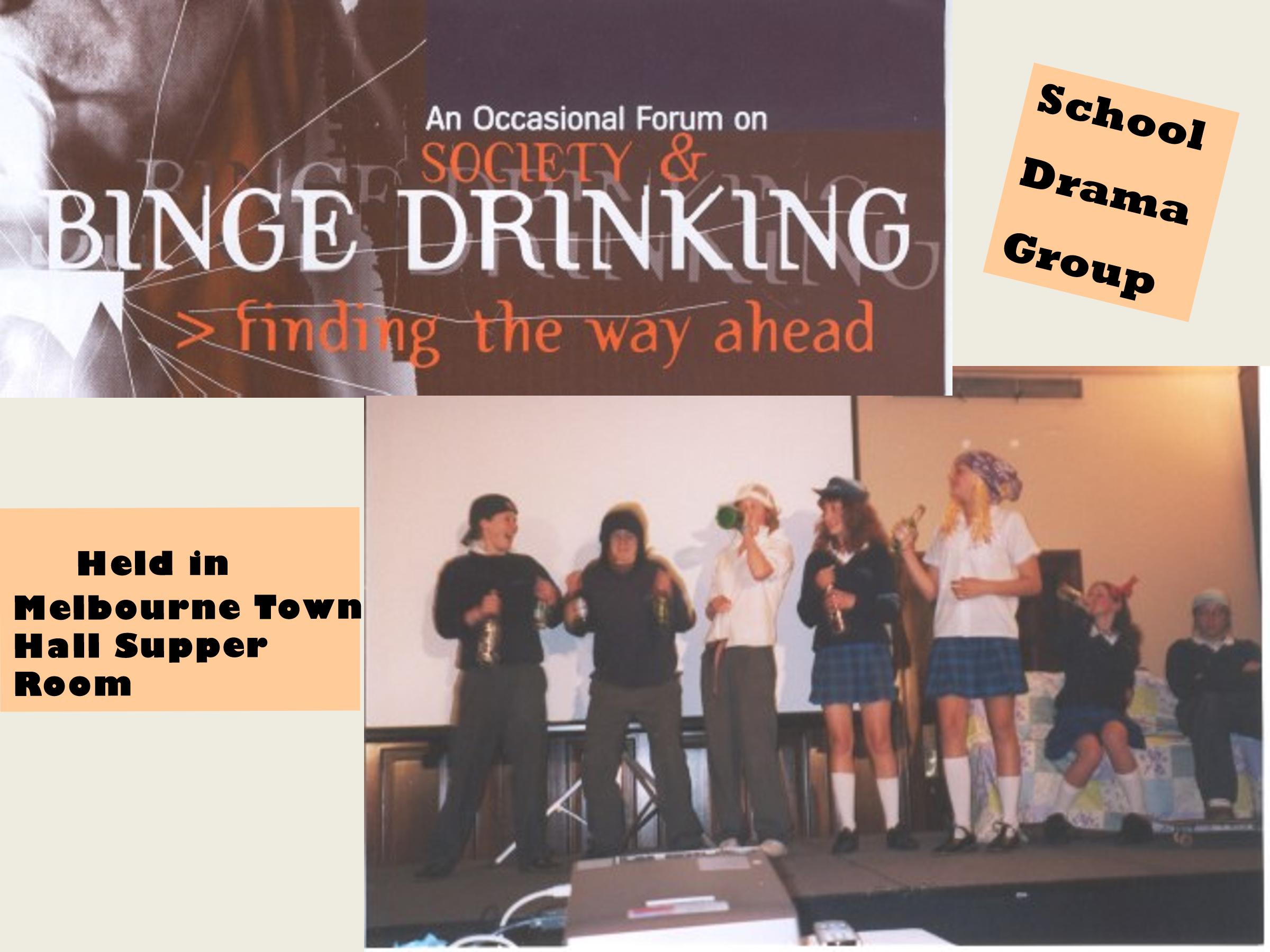
fASD - Foetal Alcohol Spectrum Disorder
FASD has long been a major concern and WCTU have had a series of well-researched, up-to-date information leaflets, including one specially for indigenous women. Realizing the importance of visual aids, a model of an FASD baby was purchased in 2008. WCTU has used several new ideas for publicising the need to avoid alcohol while pregnant or breast-feeding. In 2005 Ellen Chandler developed “seed-sticks” – a small packet like a packet of matchsticks but the “matches” had forget-me-not seeds on them. On the front was a message, “Forget me not Mummy. When you drink, I drink too.”
Later it was little plastic band-aid packs with the message: “Babies and grog don’t mix. Band-aids won’t fix” and a sticky notepad with the message: “Take note! Babies and booze don’t mix. No alcohol is the best fix.” Thousands of these were purchased and distributed to doctors, Infant Welfare Centres, and anywhere else members could give them out.
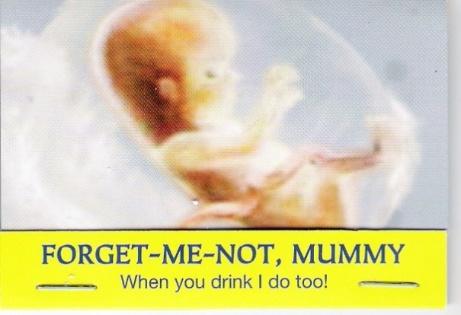

A new venture in November 2018 was to put an advertisement about FASD on the side of a bus in Geelong. It had a picture of three babies, a no alcohol symbol, and the message, “For baby’s sake THINK – DON’T DRINK especially if pregnant or hoping to be pregnant.” The following year the ad was put on a bus in Bendigo. During 2021 the ad was changed to fit on the rear of buses which have been running in Frankston, Pakenham, Tullamarine, Ballarat, Mildura and the Latrobe Valley.
From October 2019 WCTU has been showing FASD ads on TVs in doctor’s waiting rooms in the Dandenong area.
FASD Day is celebrated on 9th September annually. WCTU has traditionally written to newspapers and phoned talk-back programs, with some success. A letter was published in the Age in 2020 and a member had a good discussion on ABC talk-back in 2021. It is also the day when extra effort is taken to advertise in any possible way. FASD material is always displayed at any WCTU function.

global
WCTU Drug-Free Lifestyles is part of a world-wide organization, the World Woman’s Christian Temperance Union, which has representatives in over 40 countries.
Through the years aid has been given to Unions in countries where needs have arisen. Recent welfare assistance has included: knitting many caps, scarves and tuck-ins for the Mission to Seafarers; knitting trauma teddies for the Red Cross; knitting caps for premature babies; donating to the Cancer Council through the annual Biggest Morning Tea; packing Operation Christmas Child shoe boxes for Samaritan’s Purse; providing toiletry packs for women escaping from family violence; donating lentils and other food to the Asylum Seeker Centre in Dandenong; donating to the Foundation Debora project which is run by a WCTU doctor member in Guatemala; and donating to build water wells in Africa.
Through the years WCTU has been represented at organizations with which it has a relationship – among them being World Day of Prayer, National Council of Women Victoria, Family Council, Melbourne Total Abstinence Society, Drug Advisory Council of Australia, League of Women Voters, Travellers’ Aid and Dalgarno.
While there are other organisations that are now concerned about the welfare of families and alcohol and other drugs, there is still a unique place for WCTU with our Christian and total abstinence stand for membership. We can, and must, work together with other like-minded organisations where appropriate to make the most impact on government legislation. There is still much that we can do with God’s help.
Anne Bergen
President of WCTU Victoria
2023
